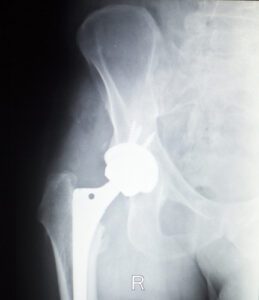
More Stryker Metal Hip Implant Settlement. More plaintiffs suing over Stryker metal-on-metal hip implants may be eligible for a 2014 settlement involving the recalled Rejuvenate and ABG II modular-neck hip stems. In November 2014, Stryker agreed to pay $1.4 billion to resolve lawsuits involving the Rejuvenate and ABG II metal-on-metal hip implants, which were recalled […]

More Stryker Metal Hip Implant Settlement. More plaintiffs suing over Stryker metal-on-metal hip implants may be eligible for a 2014 settlement involving the recalled Rejuvenate and ABG II modular-neck hip stems. In November 2014, Stryker agreed to pay $1.4 billion to resolve lawsuits involving the Rejuvenate and ABG II metal-on-metal hip implants, which were recalled due to a risk of “fretting and corrosion”. According to court records, the settlement may now be available to plaintiffs who were implanted with the recalled hip devices from 2014 to December 19, 2016. Previously, the settlement only applied to patients who received the implant and had the revision surgery before November 3, 2014.
The medical device attorneys at Parker Waichman LLP represent numerous clients in lawsuits involving metal-on-metal hip implants. The firm continues to offer free legal consultations to individuals with questions about filing a Stryker metal hip implant lawsuit.
Stryker recalled the Rejuvenate and ABG II modular-neck hip stems in June 2012 due to a risk of fretting and corrosion at the modular-neck junction. As with other metal-on-metal hip implants, the concern is that metal debris can leach into the body when the surfaces of the device rub against one another. Stryker said that fretting and corrosion of the recalled hip replacements may cause adverse local tissue reaction (ALTR), pain and swelling at or around the hip joint. Surgeons should consider examining patients with the recalled hip implants even if they do not show symptoms of implant failure, Stryker advised. Additionally, the company said, doctors may want to consider diagnostic techniques such as blood work and cross section imaging since fretting and corrosion may cause metal ions to be released into the bloodstream.
A number of lawsuits were filed against Stryker following the Rejuvenate and ABG II recall. Plaintiffs alleged that the hip implants caused adverse events such as an early revision surgery, ALTR, pain, swelling and other injuries. Lawsuits also alleged that Stryker knew about the risks but failed to warn patients or the medical community. The 2014 settlement agreed to compensate eligible claimants who underwent revision surgery with the recalled hip implants.
Parker Waichman comments that Stryker may also be facing litigation involving other hip implants, such as the Accolade and LFIT V40 femoral heads.
In August 2016, a notification posted on Health Canada’s website announced that the Stryker LFIT CoCr V40 Head and the CoCr, LFIT Femoral Heads are being recalled due to a high rate of device failure. “Stryker has received higher than expected complaints of taper lock failure for specific lots of certain sizes of LFIT Anatomic COCR V40TM Femoral Heads manufactured prior to 2011,” the notification states. The taper lock describes the section of the hip replacement that connects the femoral head (replaces top of the thighbone) to the femoral neck.
Regulators in Australia also addressed the Stryker V40 femoral heads. In a Sept. 27, 2016 notification on the Therapeutic Goods Administration of the Australian Government Department of Health website, a “hazard alert” stated that the Stryker LFIT CoCR V40 femoral heads were subject to taper lock failure, which could cause adverse events. The Australian regulatory agency warned “that some LFIT Anatomic CoCr V40 femoral heads manufactured before 2011 have a higher than expected incidence of taper lock failures.”
According to the notification, taper lock failure can cause the following adverse events:
Taper lock failure can cause dissociation of the femoral head from the hip stem, fractured hip stem trunnion, increased metallic debris, insufficient range of movement, insufficient soft tissue tension, noise from the implant, loss of implant, bone fixation strength, increased wear debris and implant construct with a shortened neck length. Orthopedic surgeons in Australia were notified of the issue, the hazard alert said.

Stryker is not the only device maker being sued over metal-on-metal hip implants. These devices, which are composed of all-metal parts, have been under increased scrutiny after DePuy issued a global recall of its ASR metal-on-metal hip implants in 2010. The implants were failing at a higher rate than expected. Although hip implants are expected to last at least a decade, a significant portion of patients were undergoing revision surgery within only a few years. Revision surgery is when the implant is removed due to implant failure, or complications. Lawsuits filed over metal-on-metal hip implants allege that the devices caused pain, inflammation, difficulty walking, implant loosening, dislocation and metal poisoning (metallosis).
Metal-on-metal hip implant lawsuits have similar allegations. Plaintiffs allege that the metal-on-metal design of the implant releases metal ions into the body and causes complications, ultimately increasing the risk of early revision surgery. Manufacturers are accused of failing to warn about the risks. Lawsuits have been filed against DePuy, Stryker, Wright Medical and other manufacturers.
Total hip replacements generally consist of an acetabular cup, which replaces the hip socket, and a femoral component replacing the thighbone (femur). In metal-on-metal hip implants, the components are made of metal. Lawsuits allege that metal debris are released when the surfaces of the implant rub together.
Metal-on-metal hip implants were approved through 510(k), a process that circumvents the need for clinical testing so long as devices are deemed similar enough, or “substantially equivalent” to a previously approved device. Patient advocates and people suing over metal hip devices argue that, because device makers used this regulatory loophole, metal-on-metal hip implants were inadequately tested. Transvaginal mesh implants, another device that has raised safety concerns, were also cleared through 510(k). This route is not intended for “high-risk” devices, which are required to go through the stricter premarket approval process; this requires companies to submit data showing their products are safe and effective.
The personal injury attorneys at Parker Waichman LLP offer free, no-obligation case evaluations. For more information, fill out our online contact form or call 1-800-YOURLAWYER (1-800-968-7529).


